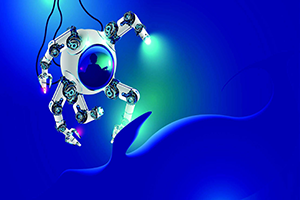
In this work we present a novel system for marine sediment sampling aimed at microplastic (MP) assessment studies. The system is composed of a medium-sized underwater legged robot (ULR) equipped with a customized sampler consisting of a grab mounted on an underactuated mechanism. The system was developed following the requirements of marine biologists actively involved in MP pollution investigation. The requirements include the penetration depth, the weight of the sample, the possibility of collecting replicas without returning to the boat or the shore, the amount of sediment perturbation introduced by the system, and the sampling accuracy. The proposed system has been tested under controlled conditions in a tank as well as in real conditions in two different field trials. Our results showed that the proposed system is capable of meeting all user requirements by taking advantage of the capabilities of ULRs in terms of low sediment resuspension, precise position control, and increased station-keeping capabilities coupled with the custom sampler design. Sediment collected during field trials has been analyzed, extracting information about the quantity and composition of MPs, to provide an overview of the complete procedure. This work represents an important step toward the use of legged robots in marine operations and contributes to highlight the importance of multidisciplinary collaborations among roboticists and scientists to develop novel solutions and increase the sampling capabilities of end users.
